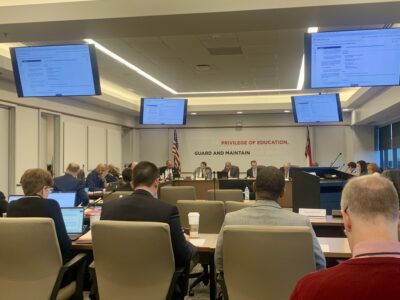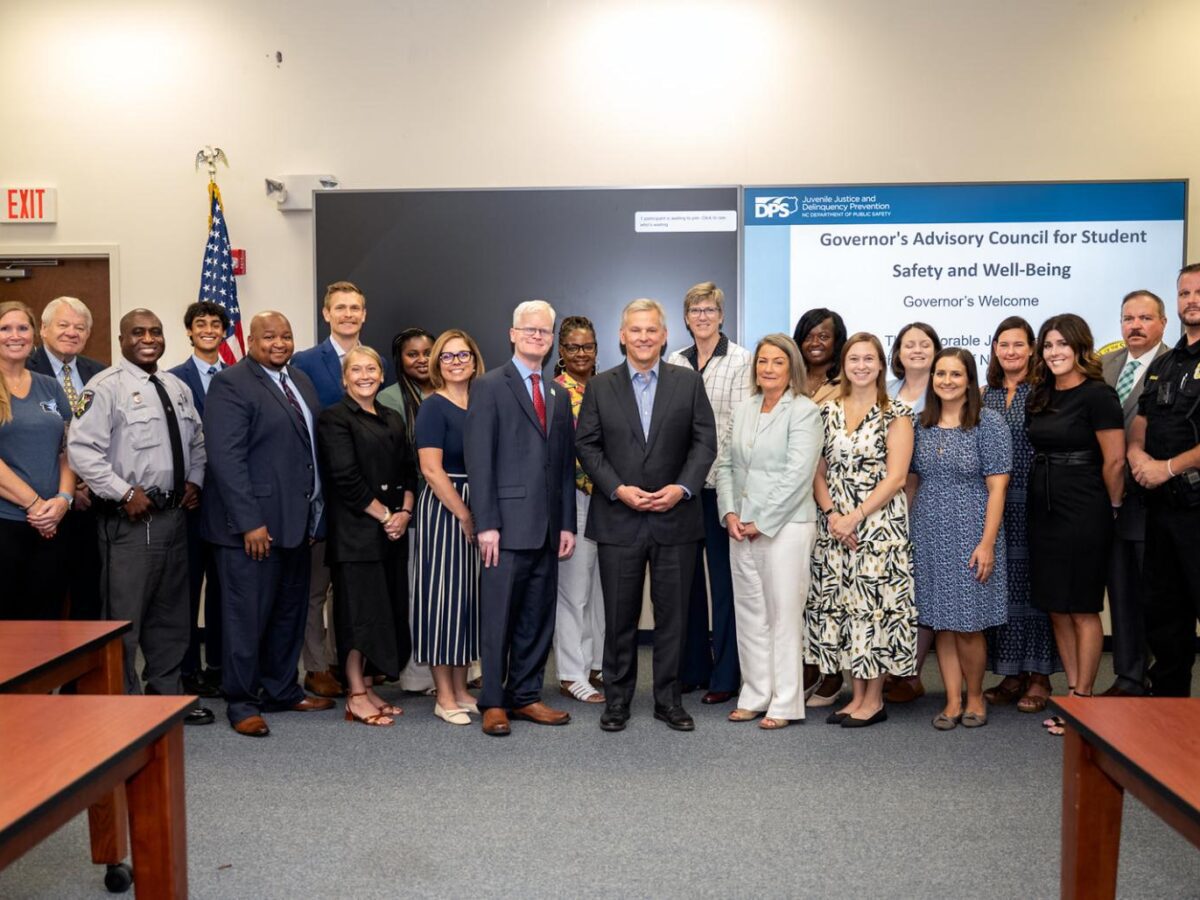
The governor’s Advisory Council for Student Safety and Well-Being meeting on Sept. 29 included discussions about challenges and opportunities to better support students’ mental health.
Gov. Josh Stein formed the council in April with the mission to “propose and further implement solutions to promote school safety and improve student physical, social, and emotional well-being.”
The council’s first three meetings focused on developing a report on best practices for schools considering policies that would limit in-school cellphone use. The report was released in June, and the council is now moving toward forming broader recommendations for Gov. Stein on student safety and well-being.
![]() Sign up for the EdWeekly, a Friday roundup of the most important education news of the week.
Sign up for the EdWeekly, a Friday roundup of the most important education news of the week.
In July, the council heard from a parent, teacher, high school senior, and school resource officer. They also received a presentation from the North Carolina Department of Public Instruction’s (DPI) NC Healthy Schools Section Chief, Ellen Essick, on data from the 2023 Youth Risk Behavior Survey.
At the September meeting, the council split into three work groups — school safety, student physical health, and student mental well-being — each charged with developing specific recommendations. Field experts presented in-depth data to each of the three work groups at the meeting.
The student mental well-being group discussed current challenges in the field, including students’ poor mental health and schools’ funding needs for specialized instructional support personnel, which includes school counselors, social workers, psychologists, and nurses. Presenters also highlighted promising programs and grants across the state.
Challenges: Student mental health, high student-to-specialized personnel ratios, and funding needs
Dr. Kisha Bryant, a state school counseling consultant with the NC Healthy Schools team, shared data from the 2023 Youth Risk Behavior Survey showing that 39% of high school students reported feeling sad or hopeless. More recent data from NC Child found that 51.9% of children ages 3 to 17 faced difficulties accessing mental health treatment they needed.
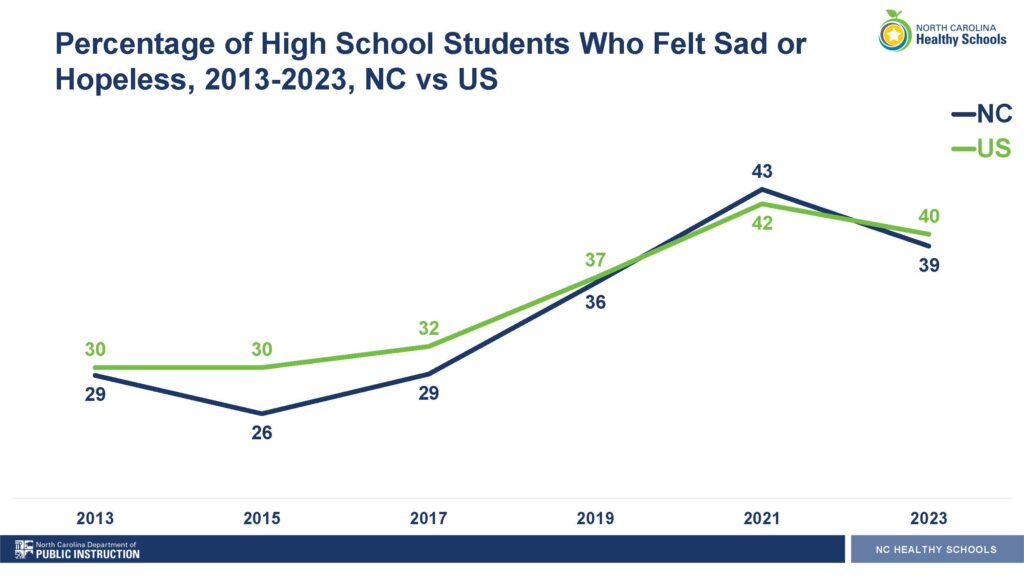
To address these mental health needs, students often need access to behavioral health services. Specialized instructional support personnel (SISP) provide services that directly support student well-being, and researchers have identified their school-based services as an important component of improving student well-being.
However, many SISP positions face workforce shortages. Bryant’s presentation shared that the average ratios of students-to-SISP positions in North Carolina are higher than national recommendations.
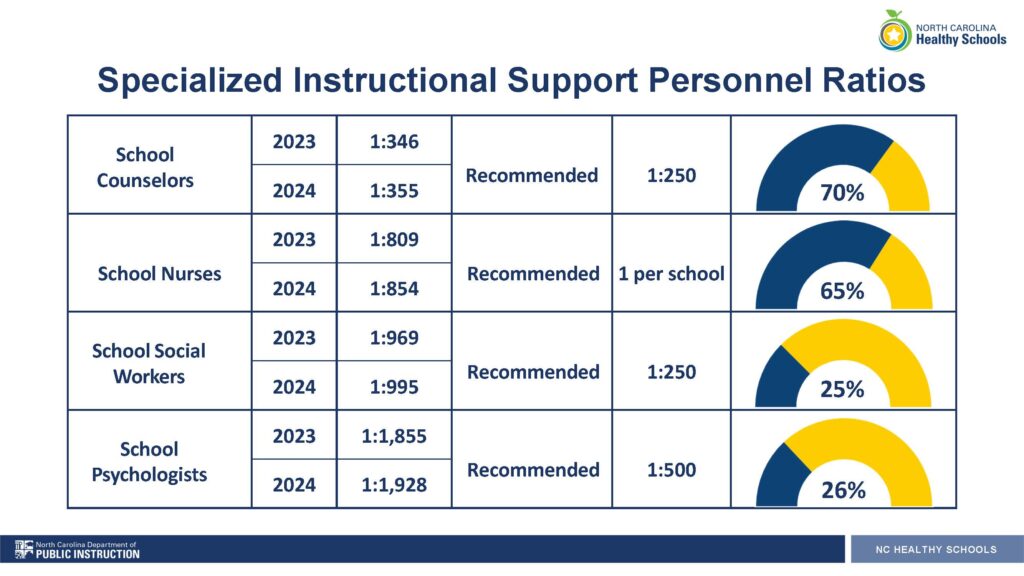
School counselor positions fare the best, with 70% of the recommended number of positions filled. However, average student caseloads for school social workers and school psychologists are far above the recommended ratios, with nearly 1,000 or 2,000 students per position, respectively.
Bryant also shared data on the distribution of these professionals across the state. Less saturated areas on each map below indicate higher student-to-SISP ratios. There are some districts with zero school psychologists, and some districts with zero school social workers.
EdNC reported in 2022 that 76% of funding for SISP positions came from the state, but even after additional federal dollars and local supplements, there were funding shortfalls that resulted in shortages. DPI’s 2024 school-based mental health plans and compliance report to the General Assembly identified the top challenges to increasing SISP staffing as inadequate funding, workforce shortages, and reliance on temporary external financial support.
Meredith Willis, student support counseling lead for the Alamance-Burlington School System, shared in a presentation to the work group that having more SISP in a school not only makes it easier for professionals to sustain their work but also creates stronger support for students.
“I can easily say, wholeheartedly, the job is so much easier when it’s a team approach. It’s never easy, but it is more manageable,” she said.
Another complication for SISP, according to Willis, stems from Senate Bill 49, entitled “Parents’ Bill of Rights.” Under the law, parents have the right to opt-in to “protected information surveys,” including those related to mental health.
Willis said that, as a result, SISP often have less access to the information needed to proactively intervene with a student. Without the “smoke before the fire,” said Willis, students are more likely to be in crisis before getting help.
High student-to-SISP ratios also mean schools often rely on outside providers to serve students in school or community settings. Willis shared that these entities also experience funding and staffing challenges.
For example, she said that the end of ESSER-funded services led to Alamance County’s consolidation of three mobile crisis units into just one, placing an increased strain on the community’s resources.
Other services are provided by Vaya Health, the Local Management Entity/Managed Care Organization that serves Alamance County. Willis shared that workforce shortages are also affecting Vaya Health, which limits the number of students her schools can successfully connect with the agency.
“We’re just out of options in some ways,” Willis told the work group.
Opportunities and ongoing efforts
While high personnel ratios and funding challenges remain, the work group also heard about promising practices, grants, and initiatives that are addressing youth mental health challenges.
Bryant shared NC Healthy School’s unified standards under the Whole School, Whole Community, Whole Child (WSCC) model as an evidence-based way to think about and approach youth well-being.
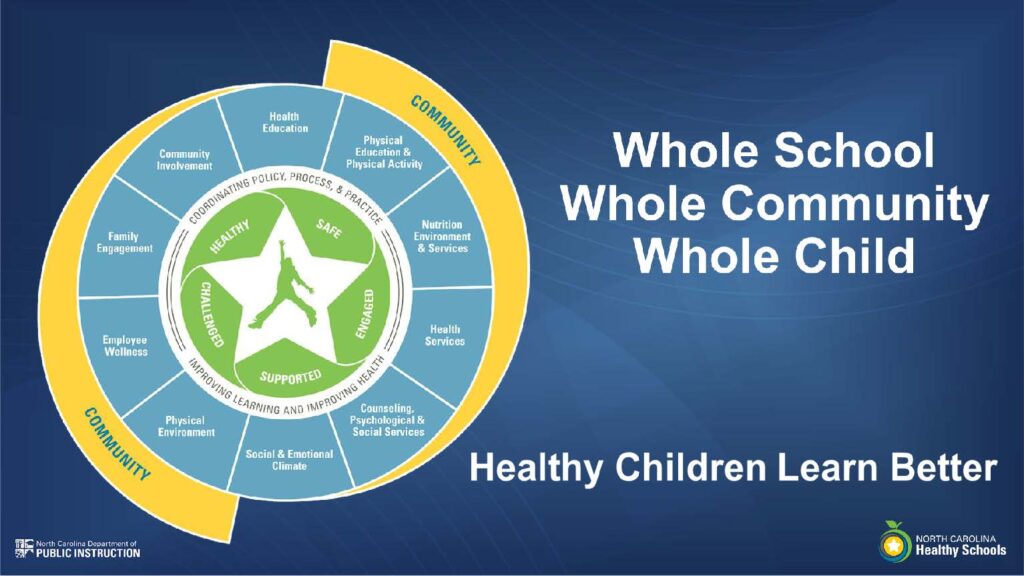
Willis highlighted that the NC Student Success Standards, developed by Bryant and the rest of the NC Healthy Schools team and approved by the State Board in 2023, have been a guiding light for her and her colleagues as they strive to provide a consistent level of care to students.
“Those are super helpful in our services these days, because we can try to relate everything back to the standards,” said Willis.
Some of the other programs and organizations Bryant highlighted in her presentation included:
- A partnership between the N.C. Department of Health and Human Services and Hazel Health, a school-based virtual therapy provider, that introduced free telehealth sessions to five North Carolina school districts in March 2025.
- N.C. Project AWARE/ACTIVATE. The national Project AWARE (Advancing Wellness and Resiliency in Education) program, known in N.C. as Project AWARE/ACTIVATE (Advancing Coordinated and Timely Interventions, Awareness, Training, and Education), helps six districts across two cohorts build their capacity to increase awareness of mental health needs, provide mental health training to school staff, and connect students with mental health services.
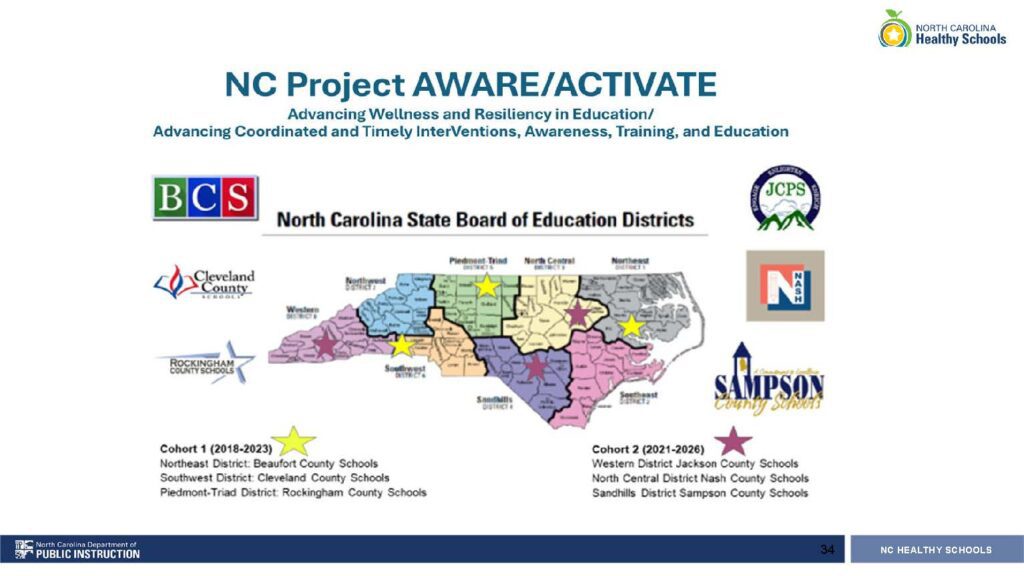
- The Rural Opportunity Institute (ROI), a nonprofit whose Medicaid Billing Toolkit helps schools effectively participate in and maximize reimbursement from the school-based Medicaid program. Bryant noted that North Carolina is one of 16 states that have expanded access to Medicaid for enrolled-children’s school-based services.
- Two federal grant programs. In 2023, North Carolina received funding from two competitive federal grant programs to increase the number of mental health providers. The School-Based Mental Health Services Grant Program, called “Project FAST” in N.C., provided funding to hire more school social workers and psychologists. However, the program was partially cancelled in April 2025, affecting four program sites in N.C. The Mental Health Services Professional Demonstration Grant program, “Project Adding Direct Support (ADS)” in N.C., allocated funding to eight school districts to incentivize local generalist counselors and social workers to upskill and obtain licensure to practice in schools.
Reflections from work groups
Senate Democratic Leader Sydney Batch, D-Wake, a co-chair on the council and member of the student mental well-being work group, reflected on what she described as siloed information in the state related to well-being and an uneven distribution of related resources across schools.
“We aren’t meeting kids where they are, and we already know where they are,” Batch said.
Other takeaways from student mental well-being work group members’ reflections after the presentations included:
- A need for advocacy to increase funding to improve SISP ratios;
- Emphasis on clear distinctions between job descriptions for schools psychologists, counselors, nurses, and social workers;
- How to best navigate information sharing between SISP, teachers, and outside health care providers that students may be referred to;
- The role adverse childhood experiences play in students’ overall well-being;
- The tension between school-based care and loss of instructional time, including considering telehealth’s limitations; and
- Whether and how school resource officers should be involved in students’ mental well-being needs.
Council members reported out from the other two work groups when the council reconvened at the end of the meeting.
The student safety work group shared their reflections on a presentation from John-Michael Keyes, founder, and Stacy Avila, training coordinator, of the “I Love U Guys” Foundation. Reflections included a need to bolster district safety directors and increase appropriations to deliver emergency response training.
The student physical health work group received presentations from Rachel Findley, senior director of DPI’s Office of School Nutrition and Auxiliary Services, and Tammy Reinhart, the director of school nutrition at Elizabeth City-Pasquotank Public Schools. Work group members reflected on the impact of school meals on students’ health and the challenges school nutrition departments face as self-sustaining, enterprise programs. The work group emphasized that recommendations should take a holistic view of student physical health.
Related reads
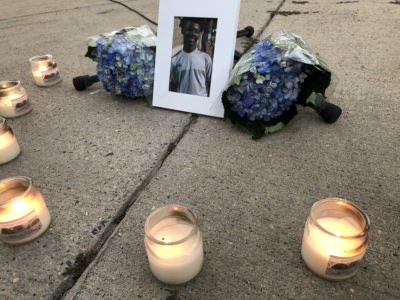
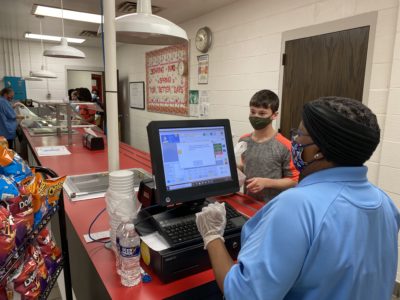
Next steps
The council’s work groups briefly began reviewing drafted literature reviews related to each work group’s focus after their respective presentations and discussions. Work groups will continue to review these drafts to ensure they reflect the stakeholder perspectives they heard during the July and September meetings.
The council’s next meeting is on Nov. 17 at the Juvenile Justice Center in Raleigh.
Previous agendas and upcoming meeting information can be found here. The council also welcomes public comment from the community on issues related to student physical, social, and emotional well-being through this form.
Recommended reading


